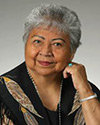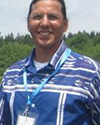
 |
 Ideas That Change The World Symposium ProfilesPanel Theme: Indigenous Peoples in CanadaPanel 3: Socio-Cultural Development
Jarret Leaman '05Senior Manager, Strategic Initiatives, Canadian Council on Aboriginal BusinessModerator
He is an Anishinaabe (Ojibway) from Magnetawan First Nation. Prior to joining the CCAB team, Jarret was a Sr. Project Coordinator at the Council of Ontario Universities, where he has managed a range of provincial projects within the postsecondary sector from Aboriginal self-identification to strategic communications. Jarret specializes in Aboriginal engagement and policy development, and has worked with several large organizations in the energy, resource and educational sectors. Jarret is highly involved within the Aboriginal community in Toronto as previous Co-Chair of the Aboriginal Postsecondary Information Program, and through volunteering as a Community Council member with Toronto Aboriginal Legal Services in the area of restorative justice. 
Alanis ObomsawinFilm maker and DirectorHonorary Degree Recipient, Trent UniversityA member of the Abenaki First Nation in Quebec, Ms. Obomsawin is one of Canada's most eminent documentary filmmakers. For 40 years, her work has helped give a voice to Aboriginal people in Canada. She has directed over 40 documentaries with the National Film Board of Canada and her work – in particular her feature documentary Kanehsatake: 270 Years of Resistance, about the 1990 Mohawk uprising at Kanehsatake and Oka – has garnered numerous international awards. The 2014 Canadian Screen Awards named her the winner of the “Humanitarian Award”. In addition, she is a nominee for Best Director in a Documentary for The People of the Kattawapiskak River TVO.

Laura Peers '81Curator, Lecturer, Anthropology and Museum Ethnography, Oxford UniversityAs Curator for the Americas Collections at the Pitt Rivers Museum, as well as a Lecturer in the School of Anthropology and Museum Ethnography at Oxford University, Dr. Peers’ research and teaching focus on the changing relations between museums and Indigenous source communities. This change has been one aspect of important shifts within anthropology critiquing its historical development in relation to colonialism, and exploring relations of power and representation with its subjects of study.

Shirley Williams '79Professor Emeritus of Indigenous Studies, Trent UniversityA member of the Bird Clan of the Ojibway and Odawa First Nations, Ms. Williams started her work in the Native Studies Department in 1986 to develop and promote Native language courses within the department. She is now an Elder and a Professor Emeritus of Indigenous Studies and has traveled across Ontario to many Indigenous communities and universities giving lectures, seminars, and workshops on various Native issues including language and culture. 
Fred Metallic '96Gespegewaq Mi'Kmaq Resource Council, Listugij, QuebecFred Metallic is resident of Listuguj and a lifetime citizen of Gespe’gewa’gi, Mi’gma’gi. In 2011 Fred graduated from York University and obtained his Ph.D. in Environmental Studies. His dissertation, written and defended in Mi'gmaw in Listuguj was a landmark achievement. This was the first time a dissertation was written solely without translation in an indigenous language. Fred also sits on the Mi'gmaq Grand Council as a Ge’ptin and works closely with the leadership in the advancement of our rights and responsibilities as a nation. Fred is currently working with the Listuguj Mi'gmaq Government as a senior policy analyst. Ideas That Change The World Symposium: Indigenous Peoples in Canada » |





























